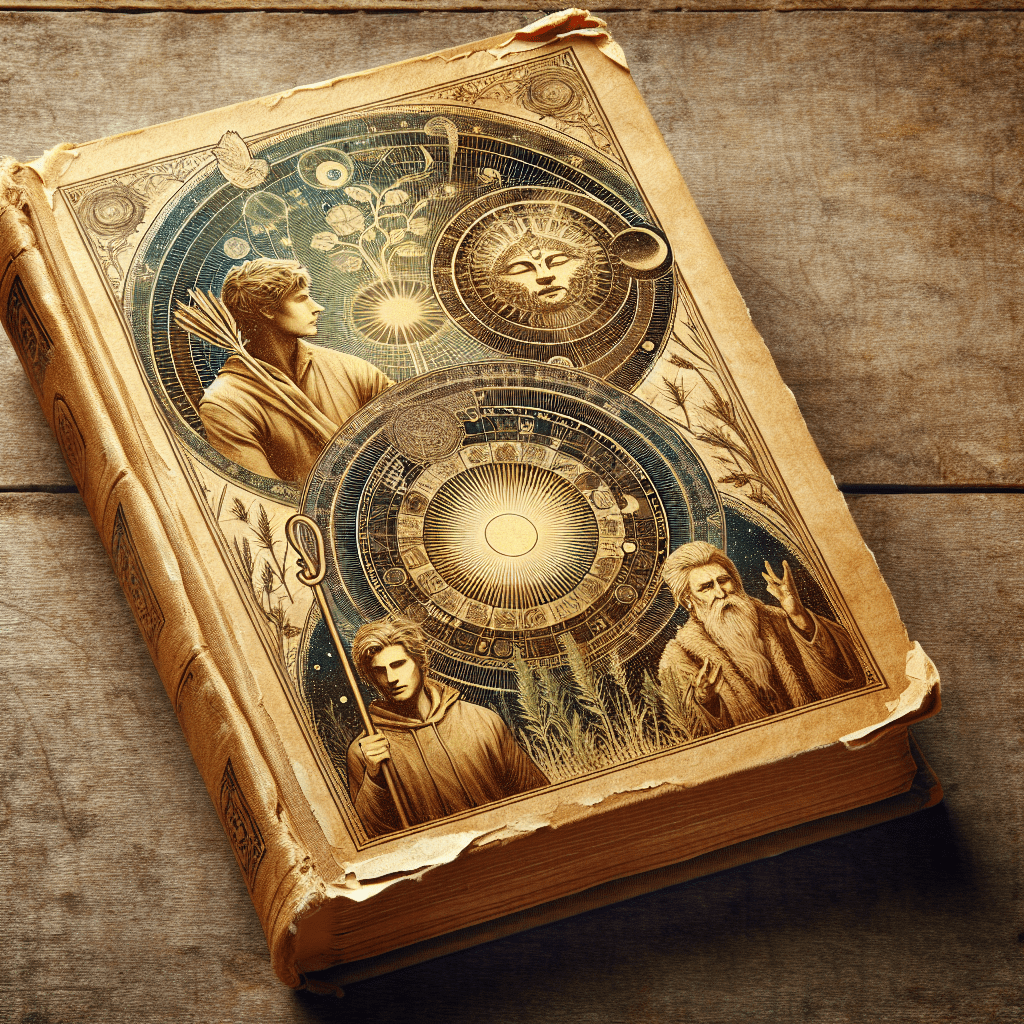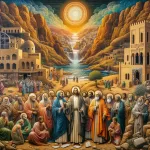-
Innehållsförteckning
"Upptäck resan mot självkännedom och strävan efter drömmar i 'Alkemisten': en berättelse om öde, förvandling och magin i att följa sitt hjärta."
"Alkemisten" av Paulo Coelho är en filosofisk roman som följer resan för Santiago, en ung herde från Spanien, som drömmer om att upptäcka en gömd skatt som ligger nära de egyptiska pyramiderna. Berättelsen utforskar teman som personlig legend, strävan efter drömmar och sammankopplingen av alla saker. Under sin resa möter Santiago olika karaktärer, inklusive Melkisedek, kungen av Salem, en engelsman och en alkemist, som alla förmedlar visdom som leder honom mot självupptäckt och uppfyllelse. Romanen betonar vikten av att lyssna till sitt hjärta och känna igen universums tecken, och förmedlar i slutändan ett budskap om den transformerande kraften i att följa sina drömmar.
Sammanfattning av Alkemisten
"Alkemisten", en roman av Paulo Coelho, följer Santiago, en ung andalusisk herde som drömmer om att upptäcka en skatt som ligger nära de egyptiska pyramiderna. Berättelsen börjar med att Santiago upplever en återkommande dröm om att hitta en skatt, vilket får honom att söka vägledning hos en zigensk spåkvinna. Spåkvinnan tolkar hans dröm och uppmuntrar honom att följa sin personliga legend, ett begrepp som representerar ens öde eller syfte i livet. Motiverad av detta avslöjande säljer Santiago sin fårflock och ger sig ut på en resa för att uppfylla sin dröm.
Under sin resa möter Santiago olika karaktärer som på ett avgörande sätt påverkar hans resa. En av de första är Melkisedek, kungen av Salem, som introducerar Santiago för idén om Världens själ och vikten av att följa sina drömmar. Melkisedek förser Santiago med två stenar, Urim och Thummim, som hjälper honom att fatta beslut längs vägen. Detta möte betonar temat vägledning och alla varelsers samhörighet, vilket antyder att universum konspirerar för att hjälpa dem som följer sina sanna önskningar.
Santiago fortsätter sin resa och anländer till Tanger, där han ställs inför utmaningar som sätter hans beslutsamhet på prov. Efter att ha blivit rånad på sina pengar känner han sig först besegrad men inser snart att han måste anpassa sig och lära sig av sina erfarenheter. Detta ögonblick markerar en vändpunkt i Santiagos karaktärsutveckling, då han börjar förstå värdet av motståndskraft och de lärdomar som kommer ur svårigheter. Han får arbete i en kristallbutik, där han lär sig vikten av att följa sina drömmar och uthållighetens transformerande kraft. Genom sina erfarenheter i butiken hjälper Santiago inte bara verksamheten att blomstra utan får också insikter om framgångens natur och betydelsen av att ta risker.
Så småningom träffar Santiago en engelsman som studerar alkemi och är besatt av tanken på att förvandla bly till guld. Engelsmannen introducerar Santiago för konceptet med de vises sten och livselixiret, som symboliserar det ultimata uppnåendet av ens personliga legend. Deras diskussioner fördjupar Santiagos förståelse för alkemi, inte bara som en fysisk omvandling utan som en metafor för personlig tillväxt och självupptäckt. Denna relation belyser temat kunskap och vikten av att lära sig av andra på sin resa.
När Santiago fortsätter sitt sökande stöter han på alkemisten, en klok och gåtfull figur som blir hans mentor. Alkemisten lär Santiago om vikten av att lyssna till sitt hjärta och känna igen universums tecken. Under alkemistens ledning lär sig Santiago att omfamna själva resan snarare än att enbart fokusera på målet. Denna lärdom är central, eftersom den förstärker idén om att strävan efter ens drömmar är lika värdefull som att uppnå dem.
Till slut leder Santiagos resa honom till pyramiderna, där han upptäcker att den skatt han sökte låg begravd i Spanien, nära det sykomorträd där han först hade sin dröm. Detta avslöjande understryker romanens centrala tema: skatten ligger inte i materiell rikedom utan i de erfarenheter, den kunskap och den personliga utveckling som man får längs vägen. Genom Santiagos omvälvande resa illustrerar Coelho vikten av att följa sina drömmar, ta till sig livets lärdomar och inse att allting hänger ihop. På så sätt fungerar "Alkemisten" som en djupgående påminnelse om drömmarnas kraft och betydelsen av att sträva efter sitt sanna syfte.
De viktigaste temana i Alkemisten
I Paulo Coelhos "Alkemisten" flätas flera viktiga teman samman för att skapa en rik väv som utforskar resan mot självupptäckt och strävan efter ens drömmar. Ett av de mest framträdande temana är begreppet personlig legend, som syftar på en individs öde eller syfte i livet. Huvudpersonen Santiago ger sig ut på en resa för att hitta sin egen personliga legend, vilket symboliserar den universella mänskliga önskan att söka uppfyllelse och mening. Detta tema väcker djupa känslor hos läsarna, eftersom det uppmuntrar dem att reflektera över sina egna ambitioner och vikten av att sträva efter dem, oavsett vilka hinder som kan uppstå.
Ett annat viktigt tema är idén om omen och att allting hänger ihop. Under sin resa lär sig Santiago att känna igen och tolka omen, som fungerar som vägledande tecken som leder honom mot sitt mål. Detta tema betonar uppfattningen att universum konspirerar för att hjälpa dem som är fast beslutna att följa sina drömmar. Genom att lyfta fram vikten av att vara lyhörd för tecknen omkring oss, antyder Coelho att individer kan hitta vägledning och stöd i sin strävan efter självförverkligande. Denna sammankoppling sträcker sig också till de relationer som Santiago skapar längs vägen, vilket illustrerar hur varje möte bidrar till hans tillväxt och förståelse av världen.
Dessutom är temat förvandling centralt i Santiagos resa. När han reser från Spanien till de egyptiska pyramiderna genomgår han en betydande personlig utveckling och utvecklas från en enkel herde till en mer upplyst individ. Denna förvandling är inte bara fysisk, utan omfattar även känslomässiga och andliga dimensioner. Santiago lär sig värdefulla läxor om kärlek, uppoffring och vikten av att lyssna till sitt hjärta. Detta tema understryker idén om att resan mot att uppnå sina drömmar är lika viktig som själva målet, eftersom den formar ens karaktär och förståelse för livet.
Dessutom spelar kärlekstemat en avgörande roll i "Alkemisten". Santiagos förhållande till Fatima fungerar som en gripande påminnelse om att kärlek inte är ett hinder för att förverkliga sina drömmar, utan snarare en källa till styrka och inspiration. Coelho illustrerar att sann kärlek stödjer personlig utveckling och uppmuntrar individer att följa sina egna vägar. Detta tema utmanar den konventionella uppfattningen att kärlek kräver att man offrar sina ambitioner, och föreslår istället att kärlek kan samexistera med strävan efter ens personliga legend.
Dessutom utforskas temat rädsla och dess förlamande effekt på individer genom hela berättelsen. Santiago möter olika rädslor som hotar att få hans resa att spåra ur, från rädslan för att misslyckas till rädslan för det okända. Coelho betonar att det är viktigt att övervinna dessa rädslor för personlig utveckling och tillfredsställelse. Genom att konfrontera och övervinna sina rädslor lär sig Santiago att de ofta är självpåtagna hinder som kan rivas med hjälp av mod och beslutsamhet.
Sammanfattningsvis väver "Alkemisten" samman teman som personlig legend, sammankoppling, transformation, kärlek och rädsla och skapar en djupgående berättelse som resonerar med läsarna på flera nivåer. Genom Santiagos resa inbjuder Coelho oss att reflektera över våra egna liv och uppmuntrar oss att följa våra drömmar, omfamna de tecken som vägleder oss och inse kärlekens och modets förvandlande kraft. I slutändan fungerar romanen som en tidlös påminnelse om att jakten på den personliga legenden är en resa värd att göra, fylld av lärdomar som inte bara formar våra öden utan också vår förståelse av oss själva och världen omkring oss.
Karaktärsanalys av Santiago
I Paulo Coelhos "Alkemisten" fungerar huvudpersonen Santiago som en övertygande förkroppsligande av resan mot självupptäckt och personlig legend. Som ung andalusisk herde inleder Santiago sitt äventyr med en enkel men djupgående dröm om att hitta en skatt vid basen av de egyptiska pyramiderna. Denna dröm fungerar som en katalysator för hans sökande och illustrerar temat att följa sin personliga legend, vilket är centralt i berättelsen. Santiagos karaktär präglas av en djup känsla av nyfikenhet och en längtan efter att utforska, egenskaper som driver honom att lämna den bekanta bekvämligheten i sitt pastorala liv på jakt efter en större mening.
Under sin resa möter Santiago olika karaktärer som påverkar hans utveckling och förståelse av världen. Till exempel introducerar mötet med Melkisedek, kungen av Salem, honom till begreppet den personliga legenden och vikten av att följa sina drömmar. Melchizedeks visdom fungerar som en vägledande kraft som uppmuntrar Santiago att följa sina ambitioner trots de hinder han kan stöta på. Detta möte tänder inte bara Santiagos beslutsamhet utan belyser också hans inledande naivitet, när han brottas med tanken på uppoffring och det engagemang som krävs för att uppnå sina mål.
När Santiago färdas genom öknen möter han kristallhandlaren, som representerar farorna med självbelåtenhet och rädslan för förändring. Köpmannens ovilja att följa sina egna drömmar fungerar som en varnande berättelse för Santiago och förstärker uppfattningen att det ofta krävs mod och uthållighet för att följa sin personliga legend. Santiagos interaktion med köpmannen avslöjar hans växande förståelse för vikten av att ta risker och omfamna det okända, vilket ytterligare formar hans karaktär när han lär sig att navigera i livets komplexitet.
En annan central person i Santiagos resa är alkemisten själv, som förkroppsligar förvandlingens visdom och mästerskap. Alkemisten lär Santiago om Världens Själ och hur allting hänger ihop, och betonar att den sanna skatten inte bara ligger i materiell rikedom utan i den kunskap och de erfarenheter som man får på vägen. Genom detta mentorskap utvecklas Santiago från en naiv herde till en mer upplyst individ, som kan känna igen de tecken och omen som leder honom mot sitt öde. Alkemistens läror utmanar Santiago att konfrontera sina rädslor och tvivel, vilket i slutändan leder honom till en djupare förståelse av sig själv och sitt syfte.
Santiagos förhållande till Fatima, en kvinna som han träffar vid en oas, lägger dessutom ytterligare ett lager till hans karaktärsutveckling. Fatima representerar kärleken och idén om att sann kärlek inte hindrar en människa från att förverkliga sina drömmar, utan snarare stöder den. Santiagos kärlek till Fatima blir en källa till styrka och visar att personliga legender kan existera sida vid sida med meningsfulla relationer. Denna dynamik understryker temat balans mellan personliga ambitioner och känslomässiga band, och visar Santiagos utveckling när han lär sig att harmonisera dessa aspekter av sitt liv.
Sammanfattningsvis är Santiagos karaktärsbåge i "Alkemisten" en djupgående utforskning av självupptäckt, motståndskraft och strävan efter drömmar. Genom sina möten med olika karaktärer och de lärdomar han får längs vägen förvandlas Santiago från en enkel herde till en sökare av visdom och sanning. Hans resa fungerar som en universell påminnelse om vikten av att följa sin personliga legend, omfamna förändring och inse att alla erfarenheter hänger ihop. I slutändan väcker Santiagos berättelse genklang hos läsarna och uppmuntrar dem att ge sig ut på sin egen jakt efter mening och tillfredsställelse.
Ödets roll i Alkemisten
I Paulo Coelhos "Alkemisten" spelar begreppet öde en central roll för att forma berättelsen och huvudpersonens resa. Berättelsen följer Santiago, en ung herde från Andalusien, som ger sig ut på en resa för att upptäcka sin personliga legend, en term som sammanfattar ens sanna syfte i livet. Redan från början vävs ödet på ett intrikat sätt in i Santiagos upplevelser, vilket tyder på att universum konspirerar för att hjälpa dem som följer sina drömmar. Denna idé sammanfattas i det återkommande temat att när man är fast besluten att förverkliga sin personliga legend, kommer ödets krafter att förenas för att underlätta resan.
När Santiago möter olika karaktärer under sina resor förstärker varje möte tanken på att ödet inte bara är en passiv kraft utan en aktiv deltagare i utvecklingen av hans öde. Den gamle kungen Melkisedek introducerar till exempel begreppet Världens själ, som innebär att alla varelser är sammanlänkade och att det bidrar till universums bästa om man förverkligar sina drömmar. Detta samband innebär att ödet inte bara är en individuell upplevelse, utan snarare ett kollektivt fenomen som binder samman alla individer i deras strävan efter uppfyllelse. Följaktligen lär sig Santiago att hans resa inte bara handlar om personliga prestationer utan också om att bidra till livets väv.
Ödets roll betonas dessutom ytterligare genom det återkommande motivet med omen. Santiago lär sig att känna igen och tolka dessa tecken som vägledning från universum, som leder honom mot hans slutgiltiga mål. Närvaron av omen fungerar som en påminnelse om att ödet ständigt är i arbete och knuffar honom längs vägen. Tron på omen ingjuter en känsla av tillit till livets process och antyder att även om individer kan möta hinder och osäkerhet, är de aldrig riktigt ensamma. Istället stöds de av en större kraft som uppmuntrar dem att hålla fast vid sina strävanden.
Berättelsen utforskar emellertid också spänningen mellan ödet och den fria viljan. Samtidigt som berättelsen förespråkar idén att ödet spelar en viktig roll när det gäller att vägleda individer mot deras öden, betonar den samtidigt vikten av personliga val. Santiagos resa präglas av ögonblick av tvivel och tvekan, där han måste bestämma sig för om han ska följa tecknen eller ge efter för rädsla och självbelåtenhet. Denna dubbelhet illustrerar att även om ödet kan ge möjligheter, är det i slutändan upp till individen att ta vara på dem. På så sätt blir samspelet mellan ödet och den fria viljan ett centralt tema, som belyser att ödet inte är en förutbestämd väg utan snarare en dynamisk process som formas av både yttre krafter och personlig handlingskraft.
Sammanfattningsvis är ödets roll i "Alkemisten" mångfacetterad och fungerar både som en vägledande kraft och en katalysator för personlig utveckling. Genom Santiagos resa illustrerar Coelho att även om ödet kan sätta scenen för ens liv, är det individens val och handlingar som i slutändan avgör resultatet. Denna nyanserade förståelse av ödet uppmuntrar läsarna att omfamna sina egna resor och inse att de inte bara är passiva mottagare av ödet utan aktiva deltagare i skapandet av sina liv. Genom att väva samman teman som ödet och den fria viljan inbjuder "Alkemisten" läsarna att reflektera över sina egna vägar och uppmanar dem att följa sina drömmar med mod och övertygelse, samtidigt som de är lyhörda för de tecken som universum ger längs vägen.
Symbolik i Alkemisten
I Paulo Coelhos "Alkemisten" spelar symboliken en avgörande roll för att förmedla romanens djupare innebörder och teman. Berättelsen följer Santiago, en ung herde, på hans strävan att upptäcka sin personliga legend, som fungerar som en metafor för ens sanna syfte i livet. Under resans gång dyker olika symboler upp, som var och en bidrar till den övergripande berättelsen och berikar läsarens förståelse för huvudpersonens förvandling.
En av de mest framträdande symbolerna i romanen är öknen, som representerar både de utmaningar och de enorma möjligheter som livet innebär. När Santiago korsar det torra landskapet stöter han på hinder som testar hans beslutsamhet och beslutsamhet. Öknens hårdhet speglar de svårigheter som människor möter när de strävar efter sina drömmar, men den symboliserar också skönheten i uthållighet. Öknens vidsträckthet fungerar som en påminnelse om att det, trots svårigheterna, alltid finns potential för tillväxt och upptäckter. Denna dualitet sammanfattar kärnan i den mänskliga erfarenheten, där motgångar ofta leder till en djupgående personlig utveckling.
En annan viktig symbol är själva alkemin, som förkroppsligar förvandlingsprocessen. I romanens kontext handlar alkemi inte bara om att förvandla bly till guld, utan också om att upptäcka sig själv och att söka efter sitt sanna jag. Santiagos möten med alkemisten belyser vikten av att förstå sitt eget hjärta och nödvändigheten av att lyssna till sin inre röst. Alkemisten lär Santiago att sant mästerskap kommer inifrån och understryker att det yttersta målet inte bara är att uppnå materiell rikedom utan att förverkliga sin potential. Denna idé väcker genklang hos läsarna och uppmuntrar dem att reflektera över sina egna resor och de förändringar de genomgår i strävan efter sina drömmar.
Dessutom fungerar det återkommande motivet med omen som en kraftfull symbol genom hela berättelsen. Omen är tecken som vägleder Santiago i hans sökande och som representerar universums sätt att kommunicera med honom. De illustrerar begreppet sammankoppling och tanken att när man är i linje med sin personliga legend, konspirerar universum för att hjälpa dem. Denna uppfattning förstärker temat öde och tron på att individer måste vara lyhörda för tecknen runt omkring dem. Genom att känna igen och tolka dessa omen lär sig Santiago att lita på resan och omfamna det okända, vilket i slutändan leder honom närmare sina mål.
Dessutom symboliserar Melkisedek, kungen av Salem, visdom och vikten av att ta det första steget mot sina drömmar. Hans roll som mentor belyser betydelsen av vägledning och stöd i strävan efter den egna personliga legenden. Melkisedeks gåva i form av stenarna Urim och Thummim fungerar som en påtaglig representation av de val som individer måste göra under sin resa. Stenarna symboliserar beslutsfattandets dubbelhet och påminner Santiago - och läsaren - om att varje val har betydelse och konsekvenser.
Sammanfattningsvis kan man säga att symboliken i "Alkemisten" berikar berättelsen och fördjupar utforskningen av dess centrala teman. Öknen, alkemi, omen och karaktärer som Melchizedek bidrar alla till en väv av mening som uppmuntrar läsarna att reflektera över sina egna liv och ambitioner. Genom dessa symboler inbjuder Coelho oss att ge oss ut på våra egna självupptäcktsresor och uppmanar oss att känna igen tecknen, omfamna förvandlingen och slutligen följa våra personliga legender med mod och övertygelse.
Inflytandet av personliga legender i Alkemisten
I Paulo Coelhos "Alkemisten" fungerar begreppet personliga legender som ett centralt tema som driver berättelsen och formar karaktärernas resor. En personlig legend definieras som en individs verkliga syfte eller kallelse i livet, en strävan som varje person är tänkt att följa för att uppnå uppfyllelse och lycka. Huvudpersonen Santiago, en ung fåraherde från Andalusien, ger sig ut på en omvälvande resa för att upptäcka sin egen personliga legend, som är att hitta en skatt i närheten av de egyptiska pyramiderna. Detta sökande driver inte bara handlingen framåt utan fungerar också som en metafor för det universella sökandet efter mening och självupptäckt.
När Santiago ger sig ut på sin resa möter han olika karaktärer som påverkar hans förståelse av Personal Legends. Till exempel introducerar Melchizedek, kungen av Salem, Santiago för idén om personliga legender och uppmuntrar honom att följa sina drömmar. Detta möte är avgörande, eftersom det tänder Santiagos önskan att leta efter sin skatt och förstärker uppfattningen att jakten på ens personliga legend är avgörande för personlig utveckling. Dessutom betonar Melchizedeks råd vikten av att känna igen och agera på omen, som fungerar som vägledande tecken längs vägen mot att uppfylla sitt öde.
Under sina resor möter Santiago flera andra karaktärer som förkroppsligar olika aspekter av att följa en personlig legend. Kristallhandlaren, till exempel, representerar rädslan för förändring och konsekvenserna av att överge sina drömmar. Trots att han har potential att uppnå storhet väljer han att stanna kvar i sin bekvämlighetszon, vilket illustrerar farorna med självbelåtenhet. Den alkemist som Santiago så småningom möter förkroppsligar däremot den visdom och det mod som krävs för att följa sitt sanna kall. Alkemisten lär Santiago att resan i sig är lika viktig som målet, och betonar att de lärdomar man drar längs vägen är avgörande för att uppnå sin personliga legend.
Temat personliga legender är dessutom intimt förknippat med idén om världens själ, en andlig kraft som förenar allt levande. Coelho menar att när en person förverkligar sin personliga legend bidrar han eller hon till en större väv av existens. Denna sammankoppling understryker vikten av att följa sina drömmar, eftersom det inte bara uppfyller personliga ambitioner utan också berikar andras liv. Santiagos resa illustrerar slutligen att strävan efter en personlig legend inte bara är en självisk strävan; det är en väg som främjar tillväxt, förståelse och enighet bland alla människor.
Under sin resa ställs Santiago inför många utmaningar och hinder som sätter hans beslutsamhet på prov. Dessa prövningar tjänar till att förstärka uppfattningen att strävan efter en personlig legend är fylld av svårigheter, men det är genom att övervinna dessa utmaningar som individer upptäcker sina sanna jag. Santiago lär sig att lita på processen och att lyssna till sitt hjärta, som vägleder honom mot det slutgiltiga målet. Denna självupptäcktsresa är en universell upplevelse som väcker genklang hos läsare som kanske också brottas med sina egna ambitioner och rädslor.
Sammanfattningsvis är inflytandet från personliga legender i "Alkemisten" djupt och mångfacetterat. Genom Santiagos resa utforskar Coelho betydelsen av att följa sina drömmar, hur alla varelser är sammanlänkade och den transformerande kraften i självupptäckten. Berättelsen fungerar som en påminnelse om att även om vägen till att uppfylla sin personliga legend kan vara utmanande, är det i slutändan en resa som är värd att göra, eftersom den leder till personlig tillfredsställelse och en djupare förståelse för ens plats i världen.
FRÅGOR OCH SVAR
1. **Vad är huvudintrigen i "Alkemisten"?**
"Alkemisten" följer Santiago, en ung herde, som drömmer om att hitta en skatt i närheten av de egyptiska pyramiderna. Han ger sig ut på en självupptäcktsresa och möter olika karaktärer som lär honom om vikten av att följa sina drömmar och lyssna till sitt hjärta.
2. **Vilket är det centrala temat i "Alkemisten"?
Det centrala temat är strävan efter den egna personliga legenden, eller det sanna syftet med livet. Romanen betonar att om man följer sina drömmar och lyssnar till sitt hjärta kan det leda till tillfredsställelse och självupptäckt.
3. **Vilka är huvudpersonerna i "Alkemisten"?
Bland huvudpersonerna finns Santiago, Melchizedek, kungen av Salem, som uppmuntrar Santiago att följa sin dröm, kristallhandlaren, som lär Santiago vikten av att ta risker, och alkemisten, som vägleder Santiago på hans resa för att förstå världens själ.
4. **Vilken roll spelar ödet i "Alkemisten"? **
Ödet skildras som en vägledande kraft som hjälper individer att uppnå sina personliga legender. Romanen antyder att universum konspirerar för att hjälpa dem som strävar efter sina drömmar, vilket förstärker idén om att ödet är sammanflätat med personlig ansträngning.
5. **Hur behandlar "Alkemisten" begreppet rädsla? **
Rädsla skildras som ett betydande hinder för att förverkliga sina drömmar. Santiago lär sig att det är viktigt att övervinna rädslan för att växa som människa och att den ofta hindrar människor från att förverkliga sina verkliga önskningar.
6. **Vilken betydelse har resan i "Alkemisten"?**
Resan symboliserar processen av självupptäckt och personlig utveckling. Santiagos resor ger honom värdefulla lärdomar om kärlek, förlust och vikten av att lyssna till sitt hjärta, vilket i slutändan leder till att han inser att skatten han sökte hela tiden fanns inom honom.Sammanfattningsvis är "Alkemisten" av Paulo Coelho en djupgående berättelse som utforskar resan mot självupptäckt och strävan efter en personlig legend. Teman som ödet, alltings sammankoppling och vikten av att följa sina drömmar genljuder i hela berättelsen. Karaktärerna, i synnerhet Santiago, förkroppsligar sökandet efter mening och uppfyllelse och illustrerar den transformerande kraften i kärlek, tro och uthållighet. I slutändan betonar romanen att själva resan är lika viktig som destinationen, och uppmuntrar läsarna att lyssna till sina hjärtan och omfamna sina unika vägar.




